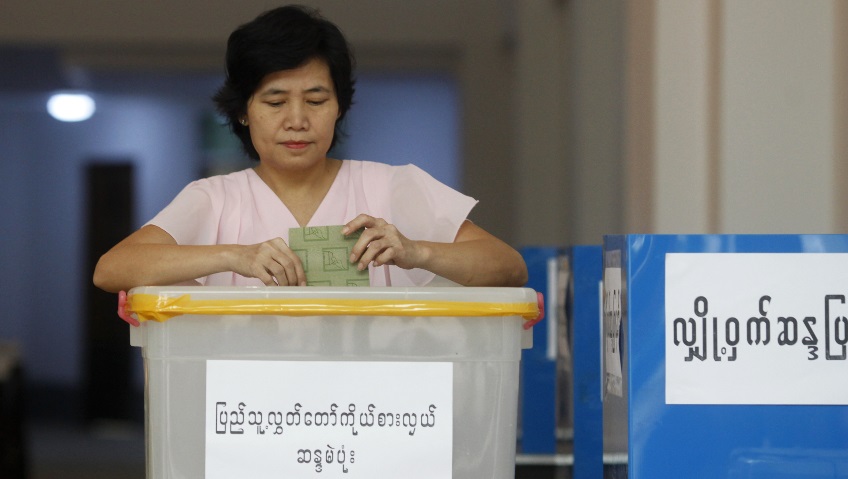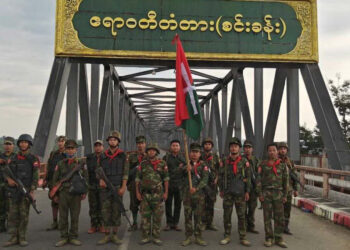Amid all the upcoming election’s complexities, diverse stakeholders and what former US Secretary of Defense Donald Rumsfeld once famously termed “known unknowns,” it’s fair to ask the question: What does this vote actually mean?
Ultimately, there are two overarching components to the Nov. 8 poll: Voters will be weighing in on the current government’s performance since taking power in 2011, and choosing who will have a say in determining policy and the shape and scope of the country’s democratic transition over the next five years.
A foundering peace process with the nation’s ethnic armed groups and as yet unrealized constitutional reforms are just two of the many pressing issues that the next government will inherit when it is sworn in next year, as the collective national conscience continues to grapple with the shambolic legacy of five decades of authoritarian rule.
Up to 1,171 seats will be up for election, divided between the Union Parliament (498 seats) and 14 state and divisional legislatures (673 seats in total, including 29 reserved for ethnic affairs representatives). The Union Parliament is further divided into 168 seats in the bicameral legislature’s Upper House, and 330 seats in the Lower House.
Neither house is proportionally representative of the country’s population. In the Upper House, tiny Karenni State sends as many lawmakers to Naypyidaw as Shan State, despite the latter being more than 13 times as big in terms of land mass, and home to 20 times as many people. In the Lower House, each township is reserved one representative, better representing the country’s ethnic and geographic diversity but also leading at times to large disparities between the sizes of lawmakers’ constituencies. That means a parliamentarian representing what last year’s census found to be 2,546 people in Kachin State’s Sumprabum Township has equal the legislative weight of his or her counterpart representing Rangoon’s Hlaing Tharyar Township, home to nearly 690,000 people.
Regional legislatures are permitted to pass laws on a variety of matters enumerated in Schedule Two of the 2008 Constitution, but under Burma’s centralized governance framework, the vast majority of legislation impacting constituents’ everyday lives comes from Naypyidaw, with regional budgets accounting for less than 5 percent of public spending.
Two political parties—the ruling Union Solidarity and Development Party (USDP) and the National League for Democracy (NLD)—will be the biggest contenders, but they will be joined by 90 other parties in the fight for votes this November.
While the USDP and NLD are expected to dominate much of Burma’s ethnically Bamar heartland, political parties representing ethnic minorities could pose a formidable challenge in many states. Based on preliminary candidate submissions data, two parties in Shan State, the Shan Nationalities Democratic Party (SNDP) and Shan Nationalities League for Democracy (SNLD), will field candidates in 211 and 156 races, respectively. The Arakan National Party (ANP) will also make a strong bid for seats in western Burma, and likewise ethnic minority parties in Mon, Karen, Karenni, Chin and Kachin states will vie for voters’ favor, setting the stage for what promises to be a manic campaign season beginning Sept. 8.
Based in part on the NLD’s routing of the USDP in a 2012 by-election, the party of Aung San Suu Kyi is expected to win the November poll. The sizeable ethnic party presence and the ruling party’s incumbency advantage, however, make an outright majority far from assured, and a post-2015 coalition government is as likely an outcome as an outright victory by either of the country’s two main parties.
The new Parliament elected in November will convene sometime in February, before which negotiations and backroom dealing will mean the political process—and specifically, who will be nominated for three vice presidential posts—moves out of public view. Ultimately three blocs of Parliament will nominate one vice president each: elected members of the Upper House, elected members of the Lower House, and unelected military representatives, who are constitutionally guaranteed 25 percent of seats in Parliament.
From there, the three vice presidential nominees will be put to a vote in the full Union Parliament, with the winner assuming the presidency and thereafter going about the business of state for the next five years. The immediate aftermath will involve the formation of a cabinet, including six appointments to powerful President’s Office ministerial posts and the selection of leaders for some 30 subordinate ministries.
The current government’s term of office expires on March 29.
[images]
In a report earlier this year, the Brussels-based International Crisis Group said the period between election day and lawmakers’ vote for the president would be “one of considerable uncertainty, possibly tensions … when messy, potentially divisive horse-trading will occur over who will become president, with whose support and what quid pro quos.”
What can be said with certainty is that newly elected lawmakers will not be putting forward the name of the popular Suu Kyi for a presidential nod, owing to a constitutional provision barring her from the office because her children are foreign nationals. Suu Kyi’s bid to have that provision revoked has so far come to naught, and no change from the charter status quo is expected in time for the presidential vote.
In light of this, Suu Kyi’s designs vis-à-vis the presidency remain unknown, though in July she said her party would field a candidate.
While incumbent President Thein Sein’s intentions are equally unclear, many interpreted his Aug. 12 ouster of USDP chairman Shwe Mann—himself a presidential aspirant—as indication that he would seek re-election. Though Thein Sein will not run for a seat in Parliament, presidential eligibility criteria do not require that nominees be sitting lawmakers.
All of this, and comments from military commander-in-chief Min Aung Hlaing indicating that he too is not ruling out a presidential bid of his own, means that unless a more clear presidential outlook materializes, voters face the prospect of entering the polling booth on Nov. 8 with no real idea of who will ultimately emerge as “their” president.
‘Discipline-Flourishing Democracy’
For all the talk of Burma’s democratic awakening over the last four years, the fact is that when voters go to the polls in November, they will be electing one branch of government within a system that still grants powerful political prerogatives to the military—an institution that answers to no ballot box and is ultimately accountable to no one.
Under the country’s 2008 Constitution, 25 percent of seats in the Union Parliament and each regional legislature are reserved for unelected, active service military personnel who are appointed by the commander-in-chief. This gives these unelected parliamentarians an effective veto over constitutional amendments because the approval of more than 75 percent of lawmakers is required in order to make changes to the charter.
Additionally, the commander-in-chief is constitutionally empowered to select the country’s ministers of Defense, Home Affairs and Border Affairs, also from the ranks of the Burma Armed Forces.
Further chaffing democracy advocates, and in particular Burma’s ethnic minority groups, is the constitutionally enshrined presidential power to appoint each state and division’s chief minister, who goes on to form the executive branch of state-level governments. In Burma’s ethnic minority states, lawmakers and political parties have called for chief ministers to be elected by regional legislatures, with the expectation that such an arrangement would be more likely to produce an ethnic Kachin chief minister in Kachin State, a Shan chief minister in Shan State, and so forth.
The country’s judicial system is also said to be deeply corrupt and plagued by interference from the executive branch, and few people see any quick fixes in reforming this crucial third pillar of government.
In short, after more than four years of reforms that have undeniably had impacts large and small on the people of Burma, most of those participating in the political process now acknowledge that entrenched military power will be chipped away over time, possibly decades, if indeed it is the ultimate fate of that institution at all. More than 10 years ago, the leaders of Burma’s former military regime set out a seven-step roadmap to “discipline-flourishing democracy,” and public remarks from the current crop of semi-civilian leaders have made clear that the time for the men in uniform to step back from politics and return to the barracks is not yet nigh.
When the election dust settles and the votes are tallied later this year, one thing seems clear: At best the country will have moved one step closer to full-fledged democracy, with some way still to go.

A woman votes at a ballot station during by-elections in Rangoon on April 1, 2012. Photo: Reuters

















